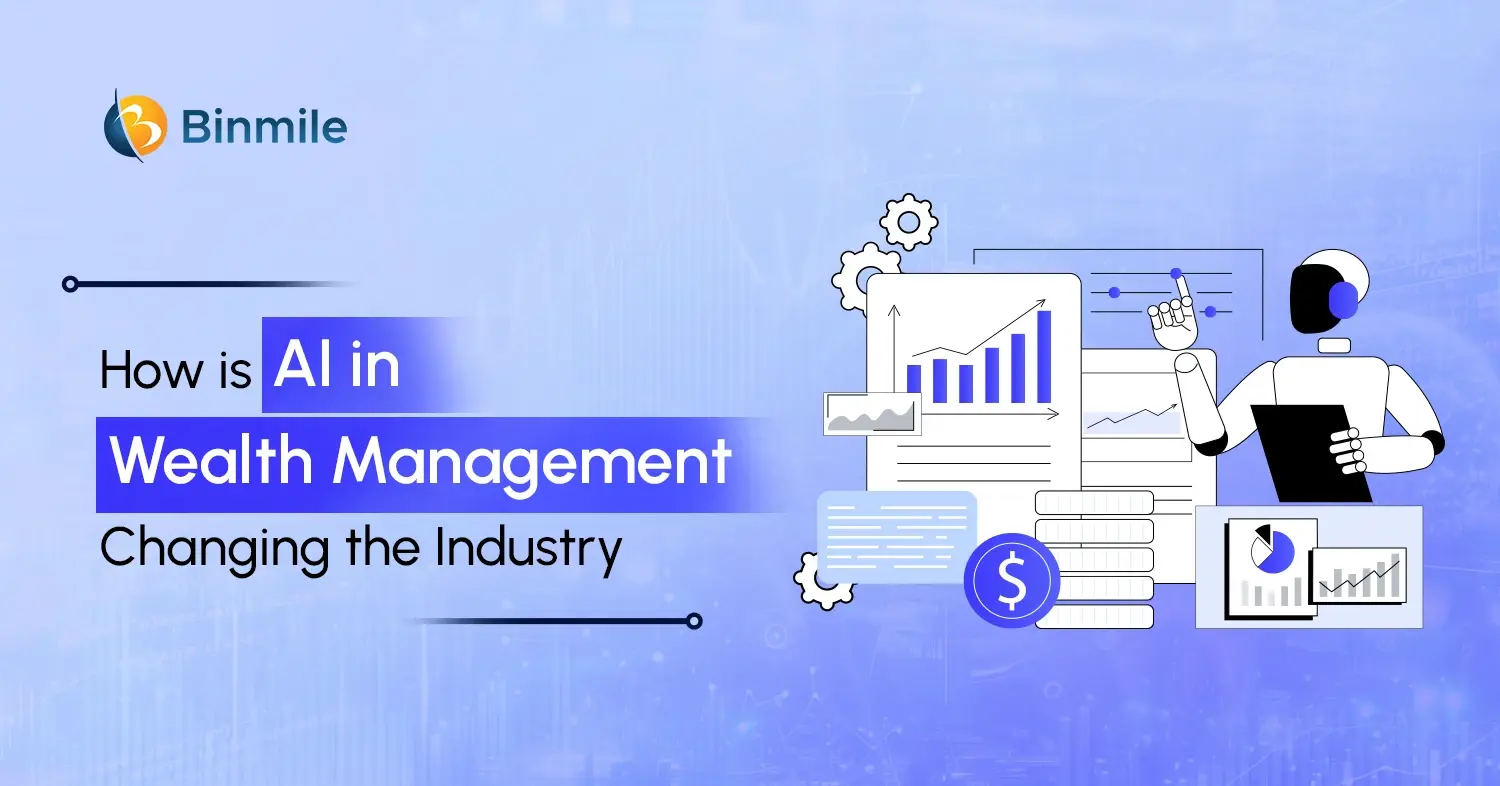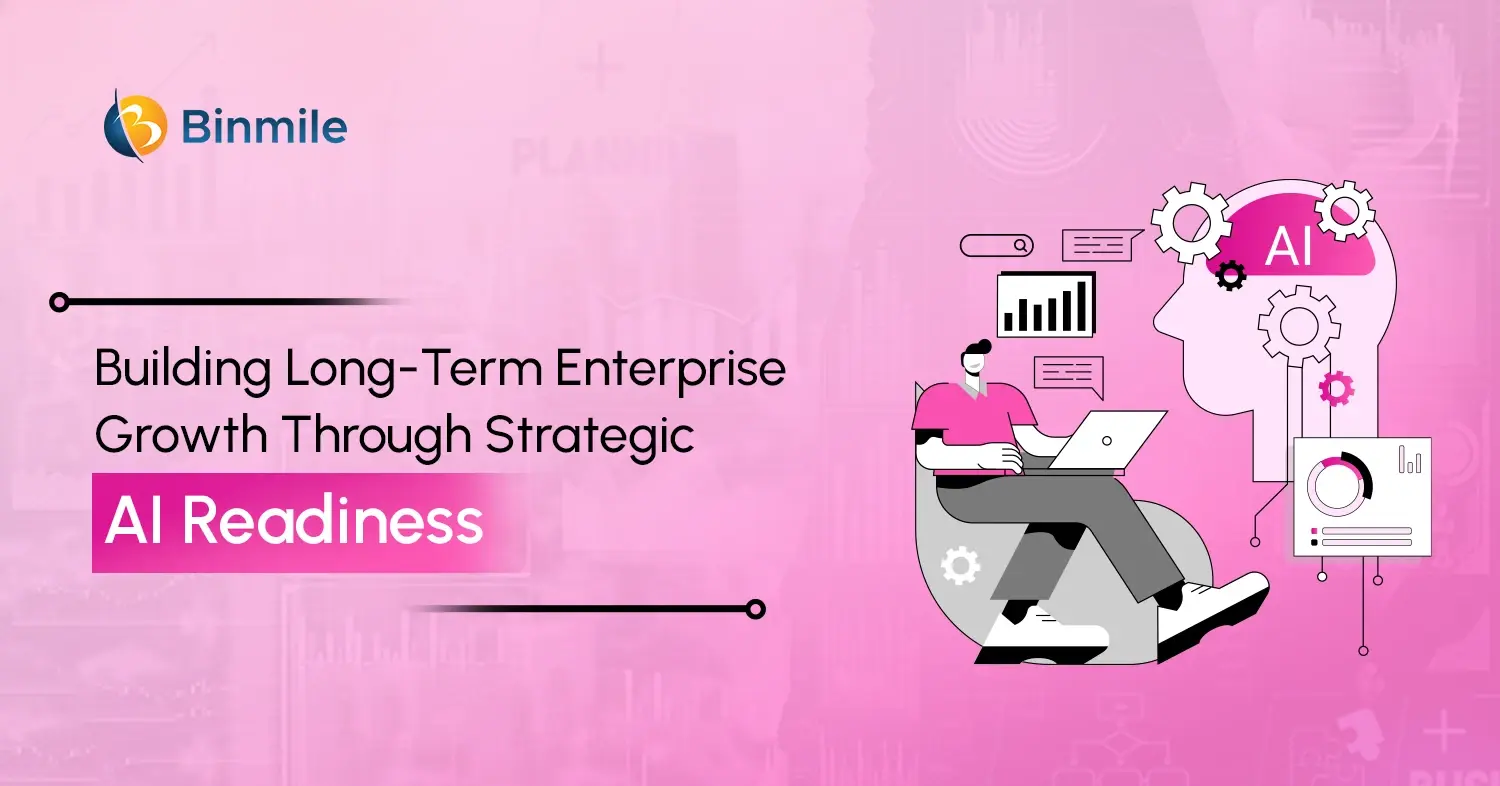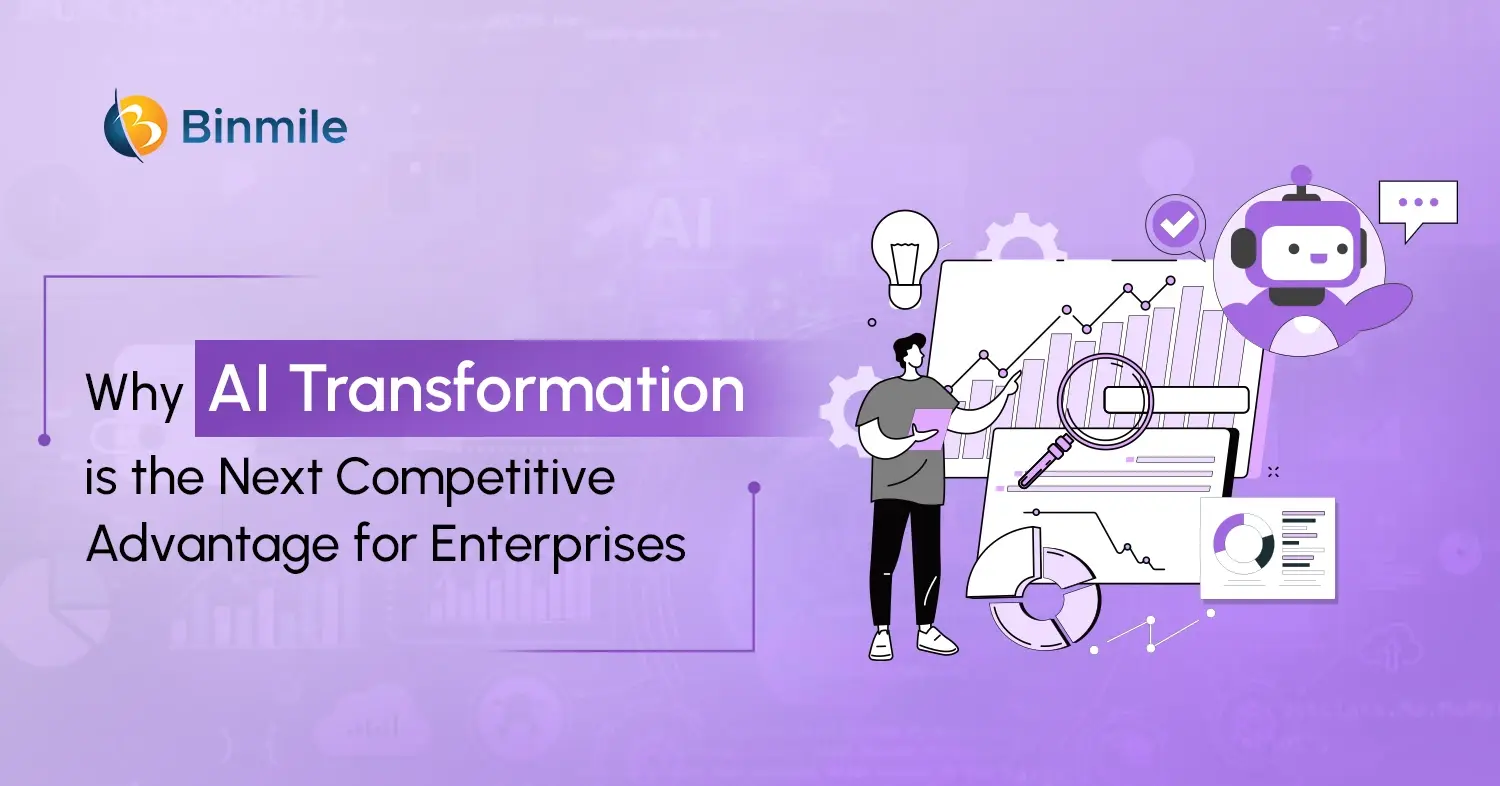Organizations around the world can’t achieve a competitive edge in today’s rapidly changing digital landscape. If they don’t know how to harness advanced artificial intelligence techniques, such as an enterprise AI solution. Intelligent enterprise AI app development solutions pose a groundbreaking technology for companies. They produce greater efficiency, improve profitability, and drive value to their business processes.
What is an Enterprise AI Solution?

An enterprise AI solution refers to an innovative technology based on artificial intelligence. It aims at solving specific business problems or improving business processes to help an enterprise or an organization drive digital transformation. The AI-based enterprise softwares is based on core AI components, namely machine learning, computer vision, and natural language processing. It can intelligently automate tasks, analyze data, and generate insights.
The industrial applications of enterprise AI app development solutions include healthcare, retail, manufacturing, finance, etc. Based on the increasing market growth of enterprise artificial intelligence worldwide as shown in the picture below, no doubt enterprise AI-powered solutions are portrayed as a core essential for companies to stay relevant amidst emerging new technologies.
Importance of Enterprise AI Solution
An enterprise AI solution is believed to catalyze the digital transformation of an enterprise. For example, AI-based enterprise softwares solutions have limitless application areas, including manufacturing, aircraft, transmission assets, power generation, fraud detection, customer retention, etc.
The goal of AI-based solutions is to bring forth automated efficiency in the business process, helping organizations to automate tasks efficiently, and save money by reducing operational costs.
Enterprise AI Solution: Top 3 Benefits to Remember
1: Better Productivity
Using an intelligent enterprise AI software solution means bringing a transformative solution in terms of streamlined processes, and efficient use of in-house resources within an organization. Since artificial intelligence is capable of automating most of the tasks that are mundane and repetitive, using AI Automation tools undoubtedly paves the path for greater efficiency in your employee productivity, like engaging your staff in more strategic activities.
2: Data-Based Crucial Insights
Enterprise AI-powered software solutions are designed to help you with crucial data-based insights so that you can make crucial decisions to benefit your business. AI-powered systems generate real-time insights by meticulously analyzing huge volumes of data. As a result, it enables enterprises to make strategic decisions based on data-based key insights.
3: Stay Competitive in the Niche
Software that harnesses the power of artificial intelligence is crucial for enterprises, in terms of gaining a competitive edge in the market. For example, you can use AI-powered systems to drive revenue streams, save money from expensive operational costs, and streamline your business processes efficiently. These benefits collectively help your business gain exposure to the competitive business landscape, enabling it to remain authentic in its niche.
Latest Trends in the Field of an Enterprise AI Solution
- Intelligence-Driven Automation: It combines artificial intelligence and robotic process automation (RPA) to streamline business activities and drive greater performance excellence in inventory and supply chain management.
- AI-as-a-Service: Firstly, it helps organizations to outsource their core IT functions to rule out hassles, like setup, maintenance, or upgrades. Secondly, businesses can use Artificial Intelligence As A Service to get hands-on experience with AI setups before investing in robotics or skilled resources to design and manage everything.
- MLOps Integration: MLOps (Machine Learning Operations) is an emerging trend in enterprise AI. Using the core function of machine learning engineering, it maintains the quality and creation of ML and AI solutions. Integrating MLOps means solidifying the power of AI to enhance customer engagement.
- AIOps: Artificial intelligence for IT operations (AIOps) uses machine learning capabilities to process huge amounts of data sourced from IT apps and components. Implementing AIOps means accelerating Mean Time To Resolution (MTTR). It reduces operational costs and enables effective cross-team collaboration within an enterprise.
- Ethical AI: The reason it is an emerging trend in the field of enterprise AI solutions is the focus on developing an ethical AI model to ensure adherence of AI to ethical guidelines about accountability, transparency, and responsible use of AI.
Step-by-Step Guide to Building an Enterprise AI Solution
Building an enterprise AI-based solution is quite a delicate procedure. From defining the core objective of your project to its materialization, launch, testing, and maintenance, it seems that the steps to build a futuristic solution are endless and herculean. Read our rundown on each step involved in the process of building an effective enterprise AI solution.

1. Identify the Problems to Solve With Your App
You must ideate problem areas that you think can be solved using your brainchild AI-powered app. From customer experience to operations and revenue, you can consider various factors in which the application of AI solutions will prove highly effective. Once done, align the problems with the project’s goals and expectations. It will ensure that the entire project development is in sync with the overall business strategy.
Meanwhile, you also need to understand how much you are aware of the current business challenges that enterprises or organizations face these days. It will help you map out better strategies to build an AI-powered solution. Based on the AI-powered solution, you will tackle the challenges and be successful in the competitive business landscape.
2. Collect and Assess Data
You can’t build a reliable enterprise app devoid of high-quality data. Therefore, collect and assess data, in terms of its quality, relevancy, quantity, structure, and how to process and preprocess it. In the context of data being quality, make sure that it is verified for its quality in terms of being capable of solving the business problems identified in the first step.
Similarly, the relevancy of the training data means ensuring that it is structured appropriately so that the chosen algorithms of artificial intelligence can read and interpret the training data. In terms of cleaning and preprocessing the data, it simply indicates not to rule out any inconsistencies or missing values in the data. Data is formatted into usable training data for AI models.
3. Choose the Right AI Technologies
What makes building an enterprise AI application a futuristic solution? Among various criteria that you must follow, choosing the right technologies is one of them. Interestingly, there is a wide array of AI algorithms and technologies you can choose from to build an app powered by artificial intelligence.
For instance, AI technologies and algorithms you can consider include supervised learning, unsupervised, reinforcement learning, and deep learning. Each of them can be chosen to solve specific business problems. However, you need to understand certain factors, like the size and complexity of data problems to be solved, and the expected result when you troubleshoot the problem. To choose ideal AI technologies and algorithms, you need to evaluate their strengths and weaknesses respectively to arrive at a better decision.
4. Build the Data Pipeline
To ensure the success of your enterprise AI solution, the data pipeline is crucial to consider. To implement it, consider storage options, data sources, and necessary processing steps. The data pipeline is designed based on security, scalability, and efficiency to ensure it meets all the requirements regarding AI models and can solve targeted business problems. In addition, you can also consider data ingestion and storing to protect data and make it accessible for training models.
5. Train AI Models
In this step of building an enterprise AI solution, training AI models holds its prime importance. Why? Training AI models is what lays the groundwork for enabling your AI-powered app to identify and process data and recognize the patterns so that you can gain data-driven insights to make quality business decisions.
The quality of training defines the capability of AI to perform accurately and reliably. Training can’t be wrapped up in a single step. On the contrary, it is an iterative process to adjust the parameters of the models so that they perform better.
The trained models also go through an evaluation process in which developers determine whether generated predictions by the trailed models match the actual outcomes. Later, it helps determine the accuracy and reliability of the models. Based on the evaluation process, make necessary improvements and refinements to the models.
6. Deploy AI Solution
This step carries out the process of integrating AI solutions into an enterprise system so that the collaboration ensures faultless performance of the app and better value for the business. In other words, AI apps are connected to databases and APIs to ensure data exchange happens seamlessly.
On the other hand, you need to evaluate the scalability, security, and reliability of the AI-based enterprise solution. As far as reliability is concerned, it ensures that your AI-powered enterprise app performs as expected without a glitch and provides valuable insights.
7. Monitor Performance Consistently
While deployment may be the finality of an enterprise AI solution development, it doesn’t, however, connote that the process is over. You need to make sure that your app works perfectly. For this, it is essential to monitor its performance consistently. Therefore, your AI-powered solution needs evaluation by tracking key metrics, such as accuracy, relevancy, speed, and reliability.
The value of this step is that it pans out considerably well in your favor, like ensuring that your AI solution performs satisfactorily devoid of any algorithmic issues. Directly or indirectly, this step also helps your business determine its value aligned with the AI solution. For example, you get to realize if the product you have built is impacting your business positively, like reduced costs, better efficiency, and improved customer satisfaction.
Looking to implement AI in your enterprise? Consult with our experts to architect and integrate high-performance AI solutions for your business.

Discover and Explore Opportunities for Continuous Improvement
The idea behind encouraging you to follow this step is to ensure that your AI-powered app never falls short of expectations and keeps performing better over time. In other words, the goal here is to make your product relevant in the market amidst emerging new technologies and the changing needs of businesses.
Key Takeaways:
- Keep improving your AI solution to ensure it is relevant amidst new technologies and the changing needs of the business.
- It will improve the reliability and quality factor of your app, thus impacting your business positively over time.
- It will help you finetune your app in terms of updates and refinements, thus enabling it to meet the diverse needs of businesses.
- Monitor the performance of your AI solution consistently
- Performance evaluation of your solution should be based on key metrics, like accuracy, reliability, and speed.
- Don’t take for granted the algorithmic issues in the solution. Fix them
- Monitoring the performance of your AI solution also casts direct or indirect positive impacts on your business, like reduced costs, and improved customer satisfaction
- Based on the performance evaluation, you gain insight into problematic areas of your AI solution and make necessary improvements and refinements accordingly
Do You Need Help In Building An Enterprise AI Solution?
Binmile is one of the most reputed AI software development companies. It stands fully capable in terms of extending the best and timely technical assistance in helping you build a futuristic AI solution. We have a team of experienced IT professionals with an in-depth understanding of data pipelines, AI, ML, deep learning, computer vision, and related technologies.
Therefore, building a robust enterprise solution based on AI becomes an easy task when undertaken by our competent team. Schedule a call with our experts for a detailed consultation on how we can help you with innovative developments in AI.
Conclusion
Considering how AI-powered solutions are revolutionizing businesses around the world, choosing to build an enterprise AI solution aligns perfectly with current AI business trends and is the demand of the time for any organization. However, building an AI-powered solution is not an easy task. Not only will it warrant a team of highly skilled IT professionals, but a huge budgetary allocation to set up such a team and foot the cost of building an efficient AI solution. Keeping that in mind, we have jotted down the necessary steps you can follow to build an enterprise app based on artificial intelligence.
Frequently Asked Questions
AI solutions for enterprise offer numerous benefits, including improved operational efficiency, reduced costs, data-driven decision-making, enhanced customer experiences, and the automation of routine tasks.
Common use cases of AI for enterprise include predictive maintenance, fraud detection, customer service chatbots, personalized marketing, supply chain optimization, and data-driven decision-making.
Challenges in adopting AI for enterprise include high implementation costs, lack of in-house AI expertise, concerns over data security and privacy, and the complexity of integrating AI systems with legacy infrastructure.









